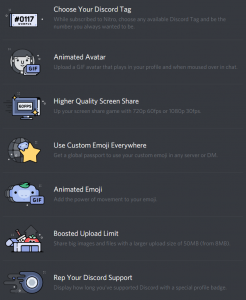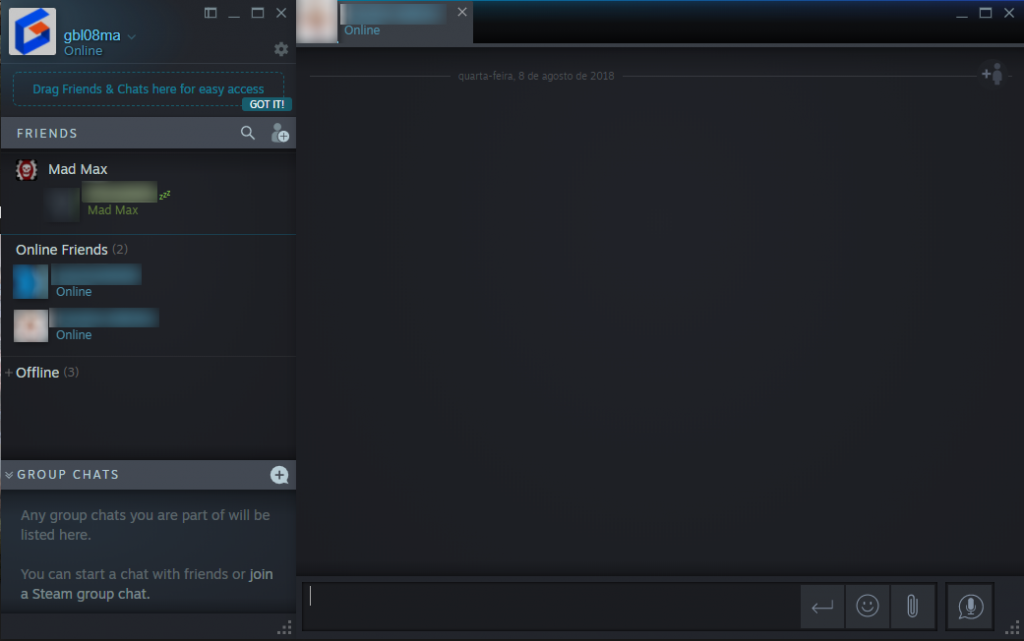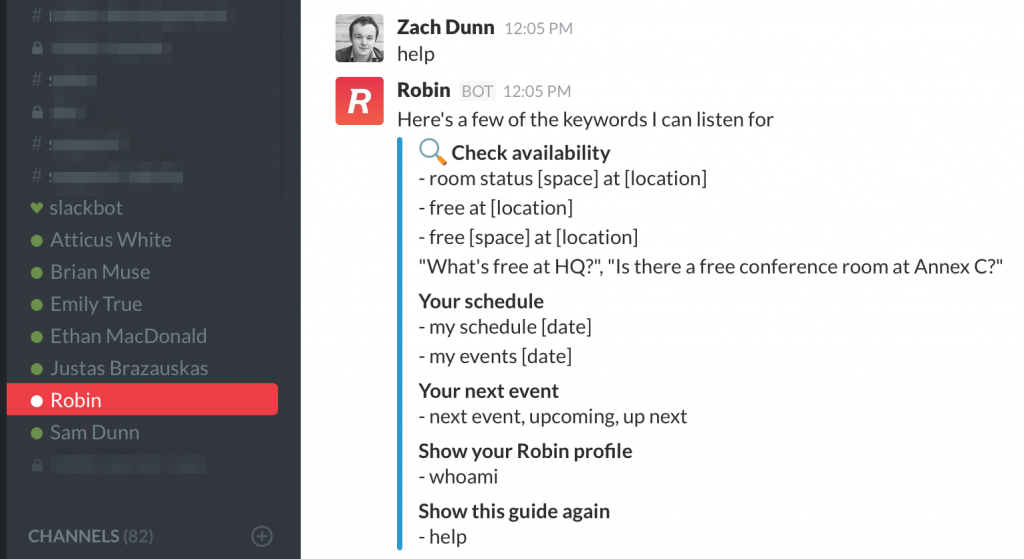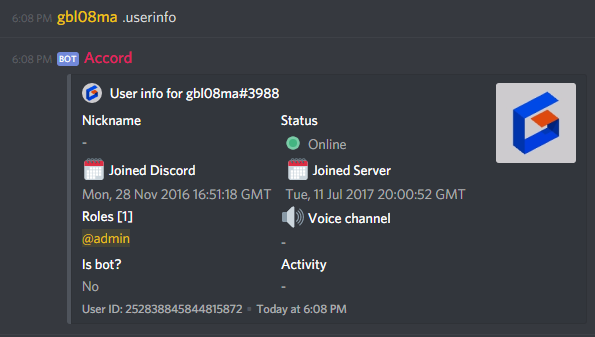I really like Discord. It’s a monster, it scares me
…and it’s also the next Steam.
Dear regular readers: we all know I’m not a regular writer, and you were probably expecting this to be the second post on the series about internet forums in 2018. That post is more than due by now – at this rate it won’t be finished by the end of the year – even though the series purposefully never had any announced schedule. I apologize for the delay, but bear with me: this post is not completely unrelated to the subject of that series.
Discord, in case you didn’t know, is free and proprietary instant messaging software with support for text, voice and video communication – or as they put it, “All-in-one voice and text chat for gamers that’s free, secure, and works on both your desktop and phone.” Launched in 2015, it has become very popular among gamers indeed – even though the service is definitely usable and useful for purposes very distant from gaming, and to people who don’t even play games. In May, as it turned three years old, the service had 130 million registered users, but this figure is certainly out of date, as Discord earns over 6 million new users per month.
If you have ever used Slack, Discord is similar, but free, easier to set up by random people, and designed to cater to everyone, not just businesses and open source projects. If you have ever used Skype, Discord is similar, but generally works better: the calls have much better quality (to the point where users’ microphones are actually the limiting factor), it uses less system resources than modern Skype clients on most platforms, and its UI, stability and reliability doesn’t get worse every month as Microsoft decides to ruin Skype some more. You can have direct conversations with other people or in a group, but Discord also has the concept of “servers”, which are usually dedicated to a game, community or topic, and have multiple “channels” – just like IRC and Slack channels – for organizing conversations and users into different topics. (Beware that despite the “server” name, Discord servers can not be self-hosted; in technical documents, servers are called “guilds”).
Much like in Slack (and, more recently, Skype, I believe), bots are first-class citizens, although they are perhaps not as central to the experience as in many Slack communities. In Discord, bots appear as any other user, but with a clearly visible “bot” tag, and they can send and receive messages like any other user, participate in text in voice chats, perform administrative/moderation tasks if given permission… to sum it up, the only limit is how much code is behind each bot.
I was introduced to Discord by a friend in the end of 2016. We were previously using Skype, and Discord was – even at the time – already clearly superior for our use cases. I found the “for gamers” aspect of it extremely cheesy, so much that for a while it put me off of using it as a Skype replacement. (At the time, we were using Skype to coordinate school work and talk about random stuff, and at the time, I really wasn’t a “gamer”, on PC or any other platform). I finally caved in, to the point where I don’t even have Skype start with my computers anymore, and the Android app stays untouched for weeks – I only open it to talk to the two or three people who, despite heavy encouraging, didn’t switch to Discord. It’s no longer the case, but the only thing Discord didn’t have back then was screen sharing, but it was so good that we kept using it and went with makeshift solutions for screen sharing.
As time went by, I would go on to advocate for the use of Discord, join multiple servers, create my own ones and even build a customized Discord bot for use in the UnderLX Discord server. Discord is pleasant to use, despite the fact that it tends to send duplicate messages under specific terrible network conditions – the issue is more prominent when using it on mobile, at least on Android, over mobile data.
Those who have been following what I say on the internet for longer, might be surprised that I ended up using and advocating for the use of a proprietary chat solution. After posts such as this one where I look for a “free, privacy friendly” IM/VoIP solution, or the multiple random forum posts where I complain that all existing solutions are either proprietary and don’t preserve privacy/prevent data collection, or are “for neckbeards” for being unreliable or hard to set up, seeing me talk enthusiastically about Discord might make some heads spin.
I suppose this apparent change of heart is fueled by the same reason why many people, myself included, use the extremely popular digital store, DRM platform (and wannabe Discord competitor… a topic for later) Steam: convenience. It’s convenient to use the same store, launcher and license enforcer for all games and software; similarly, it’s convenient to use the same software to talk to everyone, across all platforms, conversation modes, and topics. It’s an exchange of freedom and privacy for convenience.
Surprise, surprise: it turns out that making a free-as-in-freedom, libre if you prefer, platform for instant messaging that provides the desired privacy and security properties, in addition to all the features most people have come to expect from modern non-free platforms like Facebook Chat or Skype, while being as easy to use as them, is very difficult. Using the existing popular platforms does not involve setting up servers, sharing IP addresses among your contacts, dealing with DDoS attacks against those servers or the contacts themselves, etc. and for an alternative platform to succeed, it must have all that, and ideally be prepared to deal with the friction of getting everyone and their contacts to use a different platform. It was already difficult in 2013 when I wrote that post, and the number of hard-to-decentralize features in the modern chat experience didn’t stop growing in these five years. The technology giants are not interested in developing such a platform, and independent projects such as Matrix.org are quite promising but still far from being “there”. And so everyone turns to whatever everyone else is using.
In my opinion, Discord happened to be the best of the currently available, viable solutions that all my friends could actually use. It is, or was, a company and a product focused on providing a chat solution that’s independent from other products or larger companies, unlike Messenger, Hangouts or Skype, which come with all the baggage from Facebook, Google and Microsoft respectively. Discord, despite having the Nitro subscription option that adds a few non-essential features here and there, is basically free to use, without usage limits – unlike Slack, which targets company use and charges by the user.

List of Discord Nitro Perks in the current stable version of Discord. Discord is free to use, but users can pay $4.99/month or ten times that per year to get access to these features.
What about sustainability, what is Discord’s business model? To me it was painfully obvious that Nitro subscriptions couldn’t make up for all the expenses. Could they just be burning through VC money only to die later? Even by selling users’ data, it wasn’t immediately obvious to me that the service would be sustainable on its own. But I never thought too much about this, because Discord is super-convenient, and alternative popular solutions run their own data collection too, so I just shrug and move on. If Discord eventually ran out of money, oh well, we’d find an alternative later.
Back to praising the product, Discord is cross-platform, with a consistent experience across all platforms, and can be used in both personal/informal contexts and work/formal contexts. In fact, Discord was initially promoted to Reddit communities as a way to replace their inconvenient IRC servers, and not all of those communities were related to gaming. If only it didn’t scream “for gamers” all over the place…
I initially dismissed this insistent targeting of the “gamers” market as just a way to continue the segmentation that already existed… after all, before Discord there was TeamSpeak, which was already aimed at gamers and indeed primarily used by them. By continuing to target and cater to this very big niche, Discord avoided competing head-to-head with established players in the general instant messaging panorama, like the aforementioned Skype, Facebook Messenger and Hangouts, and also against more mobile-centric solutions like WhatsApp or Telegram.
I believed that at some point, Discord would either gradually drop the “chat for gamers” moniker, or introduce a separate, enterprise-oriented service, perhaps with a self-hosting option, although Slack has taught us that isn’t necessary for a product to succeed in the enterprise space. This would be their true money-maker – after all, don’t they say the big money is on the enterprise side of things? Every now and then I joked, half-seriously, “when are they going to introduce Discord for Business?”
I was half-serious because my experience using Discord, a supposedly gaming-oriented product, for all things non-gaming, like coordinating an open source project or working remotely with my colleagues, was superb, better than what I had experienced in my admittedly brief contact with Slack, or the multiple years throughout which I used Skype and IRC for such things. The “for gamers” aspect was really a stain in what is otherwise a product perfectly usable in formal contexts for things that have nothing to do with playing games, and in some situations stopped me from providing my Discord ID and suggesting Discord as the best way to contact me over the internet for all the things email doesn’t do.
These last few days, Discord did something that solved the puzzle for me, and made their apparent endgame much more clear. It turns out their focus on gaming wasn’t just because the company behind Discord was initially a game development studio that had pivoted into online chat, or because it was a no-frills alternative to TeamSpeak (and did so much more), nor because it was an easy market to get into, with typically “flexible” users that know their way around installing software, are often eager to try new things, use any platform their parents are not on, and share the things they like with other players and their friends. I mean, all of these could certainly have been factors, but I think there’s a bigger thing: it turns out Discord is out to eat Steam’s (Valve’s) lunch. Don’t believe me? Read their blog post introducing the Discord Store.
In hindsight, it’s relatively obvious this was coming, in fact, I believe this was the plan all along. It’s a move so genius it must have been planned all along. Earn the goodwill of the gamer community, get millions of gamers who just want a chat client that’s better than what Steam and Skype provide while being as universal as those among the people they want to talk to (i.e. gamers), and when the time is right, become a game store which just happens to have the millions of potential clients already in it. It’s like organizing a really good bikers convention, becoming famous for being a really good bikers convention, and then during one year’s edition, ta-da! It’s also a dealership!
The most interesting part about all this, in my opinion, is that Discord and Steam’s histories are, in a way, symmetrical. Steam, launched in 2003, was created by Valve – initially a game development company – as a client for their games. Steam would evolve to be what’s certainly the world’s most recognizable and popular cross-platform software store and software licensing platform, with over 150 million users nowadays (and this number might be off by over 30 million). As part of this evolution, Steam got an instant messaging service, so users could chat with their friends, even in-game through the Steam overlay. After a decade without major changes, a revamped version of the Steam chat was recently released, and it’s impossible not to draw comparisons with Discord.

The recently introduced Steam Chat UI. Sure, it’s much nicer, and you can and should draw comparisons, but it’s no Discord… yet.
I had the opinion that Steam could ditch its chat component altogether and just focus on being great at everything else they do (something many people argue they haven’t been doing lately), and I wasn’t the only one thinking this. We could just use Discord, whose focus was being a great chat software, and Steam could focus on being a great store. But now, I completely understand what Valve has done, and perhaps their major failure I can point out right now was simply taking too long to draft a reply. Because, on the other, “symmetrical” side of the story…
Discord was developed by Hammer & Chisel, recently renamed Discord Inc., a game development studio founded in 2012, which only released one unsuccessful game before pivoting into what they do now – which used to be developing an instant messaging platform, but apparently now includes developing an online game store too. Discord, chat software that got a store; Steam, a store that got chat functionality, both developed by companies that are or once were into game development. Sadly, before focusing on the game store part of things, Discord, Inc. seems to have skipped the part where they would publish great games, their sequels, and stop as they leave everyone asking for the third iteration.
It is my belief that it was not too long after Discord became extremely successful – which, in my opinion, was some time in 2016 – and a huge amount of gamers got on it, that they set their eyes on becoming the next Steam. It’s not just gamers they are trying to cater to, as they started working with game developers to build stuff like Rich Presence long ago, not to mention their developer portal was always something focused not just on Discord bots, but applications that authenticate against Discord and generally interact with it. This certainly helped open communication channels with some game developers, which may prove useful to get games on their store.
Discord is possibly trying to eat some more lunches besides Valve’s, too. Discord Nitro (their subscription-based paid tier, which adds extra features such as the ability to use custom emoji across all servers or upload larger files in conversations) has always seemed to me as a poor value proposition, but I obviously know this is not the universal opinion, as I have seen multiple Nitro subscribers. Maybe it’s just that I don’t have enough disposable income; anyway, Nitro just became more interesting, as now “It’s kinda like Netflix for games.” From what I understand, it’ll work a bit like Humble Monthly, but it isn’t yet completely clear to me whether the games are yours to keep – like on Humble Monthly – or if it’s more like an “extended free weekend” where Nitro users get to play some games for free while they are in rotation. (Update: free games with Discord Nitro will not be permanent)
This Discord pivot also presents other unexpected ramifications. As you might now, on many networks all game-related stuff (like Steam) is blocked, even though instant messaging and social networks are often not blocked as they are used to communicate with clients, suppliers, or even between co-workers, as is the case with Slack. I fear that by introducing a store, Discord will fall even more into the “games” bucket, and once it definitively earns the perception of being a games-only thing, it’ll be blocked in many work and school networks, complicating its use for activities besides gaming. The positive side of things is that if they decide launching that enterprise version, this is an effective way of forcing businesses to use it instead of the free version, as the “general populace” version will be too tightly intertwined with the activity of playing games.
I’ll be honest… things are not playing out the way I wish they would. Discord scares me because now I feel tricked and who knows what other tricks they have up their sleeve. I would rather have an awesome chat and an awesome store, provided separately, or alternatively, an awesome chat and store, all-in-one. (And if the Discord team reads this, they’ll certainly say “but we’re going to be the awesome chat and store, all-in-one!”) But at this rate, we’ll have two competing store-and-chat-platforms… because we didn’t have enough stores/game clients or instant messengers, right?

Because of course this one had to be here, right? I could also have added a screenshot of Google’s IM apps, but I couldn’t bother finding screenshots of all of them, let alone installing them.
You can of course say, “just pick one side and your life will be simpler”, but we all know this won’t be the case. Steam chat is a long way from being as good as Discord, and the Discord store will certainly take its time to be a serious Steam competitor. Steam chat will never sound quite right for many of Discord’s non-officially assumed use cases; for example, even if Steam copies all of Discord’s features and adds the concept of servers/guilds, it’ll never sound quite right to have the UnderLX server on Steam, will it? (Well… unless maybe UnderLX pivots into something else as well, I guess). Similarly, I’ll be harder to “sell” Discord’s non-gaming use cases by telling people to ignore the “for gamers” part, as I’ve been doing, if Discord is blatantly a game store and game launcher.
Of course I’ll keep using Discord, but I’ll probably not recommend it as much now, and of course I’ll keep using Steam, and mostly ignoring its chat capabilities – even because most people I talk to are not in there, and most of those that are, are also on Discord. But for now, I’ll keep the games tab on Discord disabled, and I seriously hope they’ll keep providing an option to disable all the store/launcher stuff… so I can keep hiding the monster under the bed.

